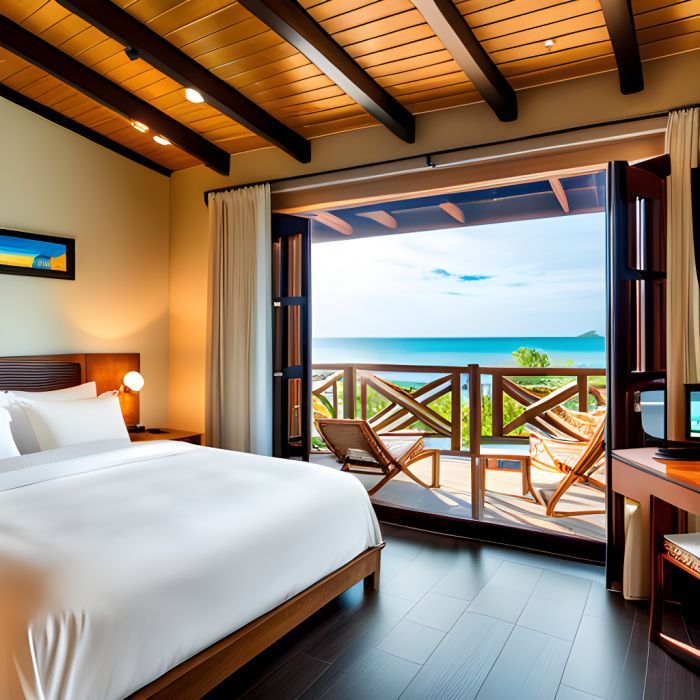
Ever since Airbnb shook up how we vacation, there's been this surge in folks wanting similar platforms. You might be a seasoned business pro or just dipping your toes into the startup world – either way, this guide has got your back. We're going to take you on a smooth ride to create an app like Airbnb, breaking it all down in a way that's totally relatable. So, get ready to roll up your sleeves as we embark on this exhilarating journey together!
Essential Features of an Airbnb-like App
To replicate the success of Airbnb, it's essential to understand the core features that make the platform user-friendly:
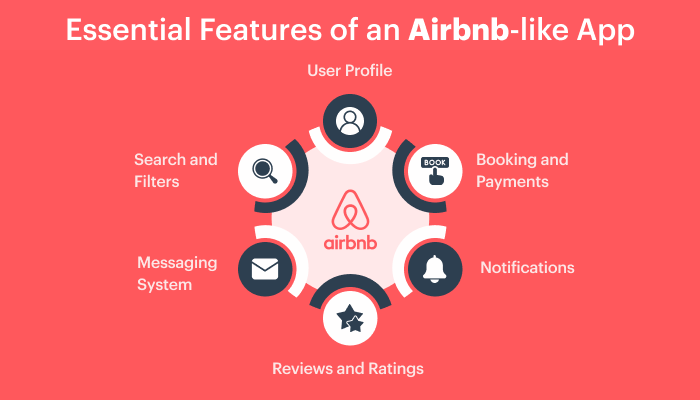
- User Profile: Every user should have a unique profile where they can manage bookings, write reviews, and update personal information.
- Search and Filters: A robust search engine with multiple filters such as location, price, property type, and availability dates is essential.
- Booking and Payments: The booking process should be streamlined and secure, with an integrated payment gateway for seamless transactions.
- Messaging System: A built-in messaging system should facilitate communication between hosts and renters.
- Notifications: Users should be notified about booking confirmations, messages from other users, and essential updates.
- Reviews and Ratings: Users should be able to rate and review properties and hosts, contributing to the platform's credibility.
Decoding the User Journey
Understanding how users interact with the platform is crucial to delivering a top-notch user experience:
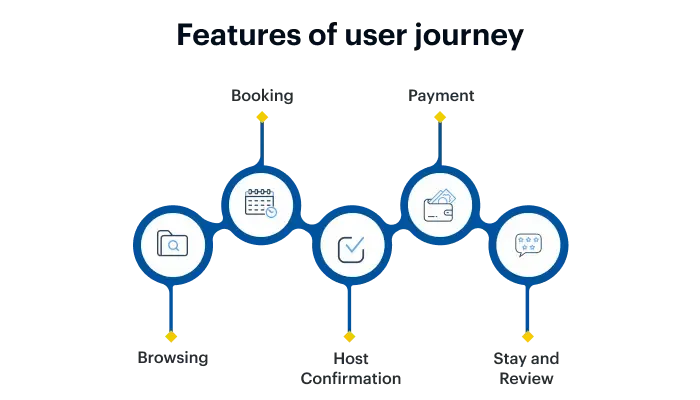
- Browsing: Users explore various properties, considering factors like pricing, location, amenities, and reviews.
- Booking: If they like a property, users proceed to book it through a straightforward and intuitive process.
- Host Confirmation: The host reviews the booking request and approves or denies it based on their preferences.
- Payment: After the host confirms the booking, the user's payment is processed through the integrated payment system.
- Stay and Review: Post-stay, users can share their experiences by leaving a review, which assists future users and helps the platform maintain quality.
Tech Stack Essentials
Developing an app requires a robust tech stack:
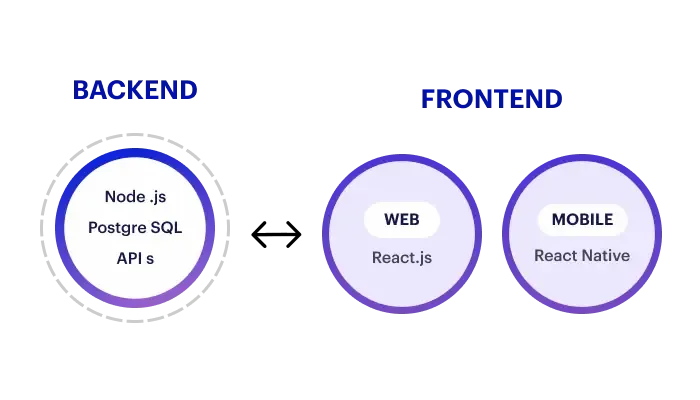
- Programming Language: JavaScript, Kotlin, or Swift can be used depending on your target platform (Web, Android, iOS).
- Front-End Frameworks: Frameworks like Angular, React.js, or Express.js can create an intuitive and responsive front-end.
- Back-End Frameworks: Ruby on Rails, Django, Node.js, or Meteor.js can be used for handling server-side logic.
- Server-Side Technologies: Your app's backend could be hosted on AWS, Azure, OpenStack, DigitalOcean, or Google Cloud.
- Databases: Depending on your requirements, you can choose MySQL, MSSQL, MongoDB, Azure DocumentDB, Cassandra, or PostgreSQL.
Developing an App Architecture
When building an app, planning exemplary architecture is a crucial step. Here's how to go about it:
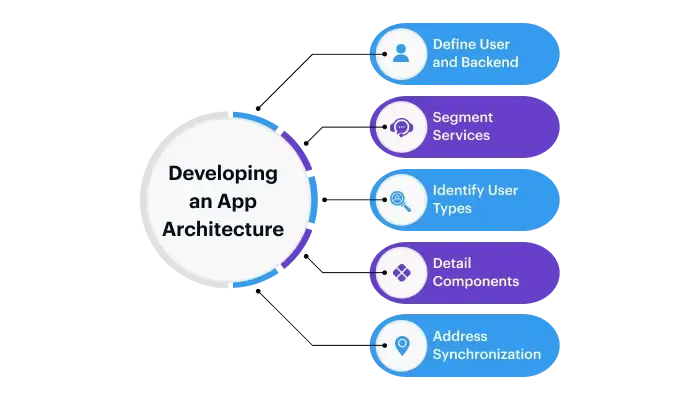
- Define User and Backend: Create a user and a backend for this user.
- Segment Services: Break down your app's backend into distinct functionalities or services. This could be user authentication, property listing, messaging, etc.
- Identify User Types: Understand the difference between mobile app users and web users, as they might interact with your backend services differently.
- Detail Components: Define each app component in detail to prevent potential issues down the line.
- Address Offline-Online Synchronization: Firebase, Realm, or Couchbase can handle offline data storage until the user's device reconnects.
Advanced Features to Consider
Consider integrating these advanced features for a better user experience and competitive edge:
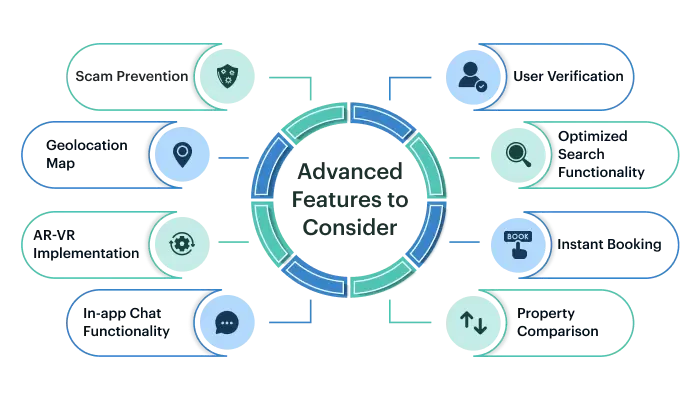
- User Verification: Verifying users' identity adds credibility to the platform and prevents scams.
- Optimized Search Functionality: Implement efficient search functionality that supports various filters.
- Instant Booking: Streamline the booking process with an instant option.
- Property Comparison: Users can compare rental properties based on various parameters.
- Scam Prevention: Use robust security measures to prevent scams and fake listings.
- Geolocation Map: Use services like Mapbox or Google Maps to display available properties on a map.
- AR-VR Implementation: Employ AR and VR technologies for immersive property tours.
- In-app Chat Functionality: Implement real-time chat functionality for better communication between hosts and guests.
Making Your App SEO-friendly
To attract organic traffic, your web app should be SEO-friendly. Maintain a well-structured website, use clean URLs, and optimize meta tags and descriptions. Keyword research is essential - use terms that resonate with your potential user base.
Marketing and Growth Hacking
Invest in marketing to reach your target audience. Consider email marketing, performance marketing campaigns, and app analytics reports. Customer support services and in-app notifications can significantly improve user experience and retention.
Conclusion
And there you have it - your step-by-step playbook to create an Airbnb-like vacation rental app! From understanding the heart of user interactions, picking the right tech weapons, and designing a robust architecture, to integrating cutting-edge features for that extra zing, we've covered it all.
But remember, cloning Airbnb isn't the goal here. The idea is to understand the winning formula and use it as a springboard to create your unique masterpiece. Be it with unique features, a different approach to the user interface, or simply serving a niche market – find your edge!
Just like a real journey, app development is filled with ups, downs, and unexpected turns. Be ready for constant fine-tuning and don't forget the power of feedback - it's the best way to ensure your app stays fresh, relevant, and user-friendly.
As you roll up your sleeves and dive into the thrilling world of app development, use this guide as your compass. May your app not just succeed, but redefine the vacation rental market. Let's get building!
Frequently Asked Questions on Building an Airbnb-like Vacation Rental App
Ques 1: What technology stack should I choose for developing my Airbnb-like app?
Ans: The choice of a technology stack depends on your specific requirements and goals. For example, if you're developing a web app, choose JavaScript, React.js, Node.js, and MongoDB. You may use Java or Kotlin with Firebase as the backend for Android. For iOS, Swift is a popular choice. Always consider scalability, security, and speed when choosing your tech stack.
Ques 2: How can I ensure user verification in my app?
Ans: You can implement multi-step verification to ensure user authenticity. This could include email confirmation, SMS verification, and integrating with third-party apps for social media verification. Depending on your app and its security requirements, a more advanced method could be biometric verification, like face recognition or fingerprint scanning.
Ques 3: What payment gateways can I use for my app?
Ans: There are many reliable payment gateways you can consider. Some popular options include PayPal, Stripe, Square, and Braintree. These platforms are widely accepted and known for their security features. The choice of payment gateway should depend on factors like the countries you operate in, transaction fees, and the kind of integration support offered.
Ques 4: How can I make my app SEO-friendly?
Ans: SEO for apps involves App Store Optimization (ASO) and web SEO if you have a supporting website. Use relevant keywords in your app's title and description, use high-quality screenshots, and aim for positive user reviews. If you have a web app, follow traditional SEO best practices like using clean URLs, optimizing your meta tags and descriptions, having a well-structured website, and creating quality content.
Ques 5: What is the best way to market my app?
Ans: The best marketing strategy often involves a mix of various channels. Social media advertising, content marketing, email campaigns, SEO, ASO, and paid advertising (like Google AdWords) are all useful. Understanding your target audience is crucial, so you can tailor your messaging and choose the right platforms to reach them.
Ques 6: How can I ensure the security of user data?
Ans: Security should be a priority from the beginning. Use secure, reliable tech infrastructure, implement strong data storage and communication encryption, ensure secure user authentication, and regularly test your app for potential vulnerabilities. Comply with all relevant privacy laws and regulations, and be transparent with your users about how you use and protect their data.
Ques 7: Can I customize my app's features?
Ans: Absolutely; your app should be unique and cater to your users' needs. While it's important to include essential features like search and booking, you can always add unique functionalities based on your market research. Ensure these customizations enhance user experience and align with your overall business strategy.
Ques 8: How long will it take to build an Airbnb-like app?
Ans: The development timeline can vary based on your requirements. An essential app version could take around 3-6 months to develop. However, a fully-featured, polished app can take 6-12 months or even longer. This timeline can change based on your team's size and experience, your exact specifications, the complexity of the design, and the technology used.
There you have it! Building an Airbnb-like app is certainly no cakewalk, but with a clear plan and the right resources, you can create a vacation rental platform that stands out in the market. Good luck on your app development journey!

